Category: Michael Novakhov’s favorite articles
Category Added in a WPeMatico Campaign

When a condo or co-op resident runs for a seat on their board, the decision to do so generally comes from a desire to ‘step up’ and participate in the governance of the place they call home, and the building or association community as a whole.
Often, the residents willing to serve on their board aren’t necessarily those with finely-honed skills and formal education in law, finance, and practical business management. And they don’t have to be—with competent management, legal, and accounting professionals on their side, a board composed of ‘civilian’ members can absolutely meet its oversight responsibilities and run a solvent, functional building or association.
But having said that, it’s also worth considering that a solid, practical base of knowledge in law, finance and management can be invaluable to a board, enabling them to interact more confidently with contractors and other professionals, make prudent financial decisions, and understand the implications of legislation and legal decisions impacting their community.
Given that, what base of knowledge does a board member—especially a newly elected one—need in order to contribute most effectively to the administration of their community? Most experts agree that understanding financial reporting, and to a slightly lesser extent, the laws and regulations governing shared interest communities in their area are the biggest help.
“Revenue, minus expenses, equals net income,” says Jayson Prisand, an accountant and principal with Prisand Mellina Unterlack & Co, an accounting firm located in Plainview, New York. “That’s pretty much the starting point. The primary goal of maintenance or common charges is always to pay for expenses. It seems obvious, but if you don’t have the revenue, how can you pay for the expenses? Board members have a clear need to understand these basic processes. Cash and reserves and their differences are also important concepts in terms of short-, medium-, and long-term planning. Board members must know short-term concepts and goals for operating, and long-term concepts for capital projects. Especially in the current environment, they should understand inflation, and in New York City (and everywhere really), local regulations. It’s not an easy task.”
“Every board member needs to develop a basic skill set,” says Steve Silberman, a CPA and partner with PBG, a financial services firm located in Glenview, Illinois. “At a minimum, they need to learn to read and understand a financial statement, rather than just relying on the treasurer. The board has a fiduciary responsibility over the financial information of the association or corporation, so all the board members need to understand their finances.
“The other concept they need to understand is fund accounting,” Silberman continues. “Operating accounts are based on fund accounting. They must also understand what a reserve fund is. A major issue for boards is the possible co-mingling between operating accounts and reserves. That requires understanding the difference between accrual versus cash-basis accounting. Most board members, regardless of their overall knowledge of accounting, understand ‘cash-basis’ accounting, as that’s how a personal checkbook works; income is accounted for when received, and expenses accounted for when paid. By contrast, accrual is more true to [a community’s] current financial position, because it records income when earned and expenses when incurred.”
“Financial literacy,” says Mark Love, principal of M. Love & Associates, CPA, with three offices in Massachusetts, “requires knowledge of matters involving finance, accounting, budgeting, taxes, investments, insurance, debt, financial planning, capital planning, and even economics.”
Michael S. Simone, an attorney and principal of The Simone Law Firm, based in Cinnaminson, New Jersey, focuses in a little more: “Board members must ensure that their association has a budget, and then make certain to run a monthly budget variance report to monitor the progress of the budget throughout the year. Understandably, everyone wants dues to be as low as possible, but an association needs to avoid having too many special assessments. Having special assessments every year is a red flag indicating that the budget is not properly funded. Furthermore, given the current stricter mortgage regulations, an association that does not have a properly funded budget might result in a potential buyer not being able to obtain a traditional mortgage.” Understanding basic accounting and financial principles is necessary for this.
Do all board members require the same level of knowledge of financial, management, legal and accounting issues? In a word, no.
However, according to Prisand, “Those board members who don’t have the most in-depth financial knowledge shouldn’t necessarily be the treasurer. The treasurer should have a solid grounding in financial data in their background. That’s not to say they couldn’t otherwise do the job, but you’re managing money—everybody’s money. There is always reliance on the management company, but don’t give them carte blanche. Overall, at least one person on the board needs to have a more complete, more complex understanding of finances and financing.”
Love concurs. “To be sure, at least one board member, generally the treasurer or the president, should have a moderate to semi-high level of understanding and awareness of these financial matters.”
Another area about which board members should have basic technical understanding is what their governing documents say and require relative to the financial management and maintenance of the property. “The first thing every board member should look at and understand are the bylaws and declarations of their association,” says Silberman. “The bylaws, etc., hold information about financial audits, what to do with excess cash from operations, and other details of financial management under the laws and regulations governing the association.” A law degree is not necessarily required for this, but as with the treasurer’s position, it certainly doesn’t hurt to have an attorney on the board. If that’s not possible, the community’s legal counsel can be tapped to provide any needed clarification.
There are several organizations whose mission it is to help educate board members in the unique aspects of governing a building or HOA—including this publication, and its companion annual and biannual Expos, which offer rosters of free educational seminars, expert panel discussions, and legal advice booths. (Visit coopexpo.com for more information, registration, and descriptions of seminars.)
Another valuable resource —and the largest U.S. organization devoted to board education—is the Community Associations Institute (CAI). “CAI has over 40,000 members,” says Simone. “Their courses are offered both online and in-person, and are an excellent way to learn more about the role of being a board member. Further there is a web forum group where associations post problems and issues they are being confronted with, which is another way to learn from other potentially similar association’s issues.”
In cases where a building or association is fortunate enough to have an accountant, attorney, financial or real estate professional as a board member—or even as a non-board resident—is it advisable for that person to help board members understand what can often be complex matters? The answer might depend on the community.
One co-op shareholder on Manhattan’s Upper West Side who is a professional commercial mortgage broker shares anonymously that in the 30 years he’s lived in his building, the corporation has refinanced its underlying mortgage twice. On both occasions, while not serving on the board, this shareholder offered his expertise to review the refi and advise the board in their decision making. The board turned down his offer both times—and in his opinion, they made serious mistakes, including the prepayment clause on the original refinance some 20 years ago, which precluded the corporation from taking advantage of lower interest rates when they had the chance.
On the other hand, Silberman says, “Boards could and should take advantage of members’ knowledge base. Depending on the size of the community, they might also have a finance committee or subcommittee apart from the board that would allow those with financial background but not on the board to serve on that committee, thereby bringing more people with knowledge into the equation.”
Prisand cautions that sometimes a little knowledge can cause friction. “I work with all types of people on boards. Senior fortune-500 types to housewives. Sometimes those with knowledge can present a different kind of problem; they think at too high a level. It’s not plain vanilla—every building is different—but it’s important to keep it fairly simple.” In the end it ‘takes a village’ to effectively run a village.
Another issue has come to the fore for boards in the aftermath of the deadly Surfside, Florida, building collapse in 2021: reserves, and reserve studies. The high dollar amounts—and high stakes—make this yet another area where board members need to have at least a working knowledge and basic understanding of both their building’s physical condition, and the financial planning needed to properly maintain it.
According to Silberman, “Boards should plan for a reserve study, and a plan for investment of those funds. They need an investment policy, and should understand the financial and accounting principles underpinning that policy, including why and how reserve money is invested, its safety and liquidity, and yield. If you’re funding a reserve project, you’ll have a better idea of why the money is invested the way it is.” That knowledge of investment strategy is a good partner to understanding the financial principles relating to your regular operations as well.
It all boils down to boards and board members being as informed as possible about what goes into governing and administering their community from day to day, from its physical upkeep to financial decision-making and long-term planning. Reading—and understanding—your governing documents, consulting your legal and financial professionals when necessary, and taking advantage of educational and training opportunities are all great ways to make the most of your tenure, and make your board the best it can be.
A J Sidransky is a staff writer/reporter for CooperatorNews, and a published novelist. He can be reached at alan@yrinc.com.

When a condo or co-op resident runs for a seat on their board, the decision to do so generally comes from a desire to ‘step up’ and participate in the governance of the place they call home, and the building or association community as a whole.
Often, the residents willing to serve on their board aren’t necessarily those with finely-honed skills and formal education in law, finance, and practica…
This audio is created with AI assistance
Support independent journalism in Ukraine. Join us in this fight.
The U.S., Israel and Ukraine are in negotiations on providing Ukraine with up to eight Patriot air defense systems, the Financial Times (FT) reported on June 27, citing five unnamed sources familiar with the talks.
The outlines of the deal, which is not yet finalized, have been discussed between ministers and senior officials of the three nations, FT’s sources said. It may include Patriot systems being sent from Israel to the U.S. and then to Ukraine.
The reports came days after Washington announced it had reprioritized near-term planned deliveries of foreign military sales to other countries, particularly Patriot and NASAMS missiles, to go to Ukraine instead.
Kyiv has been calling on its partners to provide additional air defenses as Russia intensifies its strikes against Ukrainian population centers and infrastructure. Ukraine operates at least three Patriot systems provided by the U.S., the Netherlands, and Germany, with Berlin and Bucharest recently pledging to deliver two more systems.
“Ukraine continues to work with various countries around the world on obtaining additional Patriot systems,” Foreign Minister Dmytro Kuleba told the FT, without confirming the talks.
The transfer of eight other systems could significantly strengthen Ukraine’s air defense capabilities, potentially protecting the country’s largest cities while also being used to cover key hotspots on the battlefield.
Israel announced in April that it would start decommissioning eight Patriot batteries that are over 30 years old to replace them with more modern systems. However, the batteries used in the Israel-Hamas war have not yet been deactivated due to fears of escalation, the FT wrote.
Israel has largely avoided taking sides in Russia’s war against Ukraine, and has not provided any meaningful military aid to Ukraine. It has a long-standing relationship with Russia, complicated by the significant Russian diaspora in Israel.
Kyiv voiced support for Israel after it came under a deadly attack by the Hamas militant organization in October 2023, while Hamas reportedly used Russia- and Iran-made arms in the war.
Before you skip this banner, we want to tell you something…
The Kyiv Independent doesn’t depend on a wealthy owner or an oligarch — in 2023, 80% of our revenue was from reader contributions. It’s thanks to them that we don’t have to rely on a single owner.
Support us now and help maintain our independent model and keep our articles free for everyone. Your contributions allow us to cover journalists’ salaries, report from the front lines, and fund projects like our War Crimes Investigations Unit.
Unlock the US Election Countdown newsletter for free
The stories that matter on money and politics in the race for the White House
The US, Israel and Ukraine are in talks to supply Kyiv with up to eight Patriot air defence systems, dramatically improving its ability to counter Russian air strikes.
While not finalised, the arrangement would likely involve the highly prized Patriot systems being sent first from Israel to the US, before being delivered to Ukraine.
The outlines of the deal, which would mark a shift in Israel’s relations with Moscow, have been discussed between ministers and senior officials of the three countries, according to five people briefed on the negotiations.
Israel said in April that it would begin retiring its eight Patriot batteries, which date back more than 30 years, and replacing them with more advanced systems.
But the batteries, which have been used in Israel’s current war with Hamas, have not yet been discontinued due to concerns that tensions with the Iran-backed Hizbollah militant group could erupt into a full-blown war.
If realised, such a transfer would represent a step change in Ukraine’s defensive capabilities. The country currently has at least four Patriot systems, supplied by both the US and Germany.
Ukraine has frequently requested that western allies supply it with air defence systems, in particular the US-made Patriots. Last week, the US announced that it was pausing the delivery of Patriot interceptor missiles to other nations to prioritise supply to Ukraine.
Israel has been cautious about taking sides over Russia’s invasion of Ukraine given the clout Moscow holds in Syria, where the Israeli air force often acts against Iranian proxies.

But US officials have sought to convince Benjamin Netanyahu’s government that Russia’s increasingly close ties with Iran, particularly in the field of military co-operation, are a more pressing concern.
Washington gives Israel about $3.8bn annually in military support, and by April had released an additional $14bn in emergency funds for its ally since the war with Hamas broke out.
“It would be fortuitous if these older Patriot missiles were put to good use in another theatre before they aged out,” said Tom Karako, head of the missile defence project at the Center for Strategic and International Studies think-tank in Washington, “especially given the levels of US military aid to Israel”.
While the transfer of all eight systems was being discussed, they might not all end up being sent to Ukraine, four of the people said.
Three of the people with knowledge of the discussions said Ukrainian foreign minister Dmytro Kuleba had held talks on the matter with his US counterpart Antony Blinken in recent weeks.
White House national security adviser Jake Sullivan had spoken on the issue at least twice with Andriy Yermak, the chief of staff to the Ukrainian president, the three people said.
“Ukraine continues to work with various countries around the world on obtaining additional Patriot systems,” Kuleba told the Financial Times, though he did not confirm the talks.
“We once again urge all countries that have such systems to provide them to Ukraine,” he added.
As well as discussions between the US and Ukraine, a person familiar with the diplomacy said there had also been direct talks between Israel and Kyiv on the transfer of Patriots.
The US and Ukrainian governments declined to comment.
Israel’s prime minister’s office referred questions to the defence ministry, which did not immediately respond to a request for comment.
Ukraine is battling to defend against Russian missile and bombing attacks that have crippled its infrastructure and terrorised its cities. Russia’s latest and most intense long-range air strike campaign escalated in March.
Israel’s M901 PAC-2 batteries are of an older variety than many of the Patriot systems currently in Ukraine. But according to military analysts, the older model is still fully compatible with the newer ones.
Crucially, Israel has also ample stocks of interceptor missiles — which Ukraine also needs — to go with the batteries, according to one person familiar with the size of Israel’s arsenal.
Analysts also said the old Israeli interceptor missiles had a longer range and a bigger warhead than the newer PAC-3 model.
This could make them well suited for intercepting the Russian fighter jets that have been dropping devastating glide bombs on Ukrainian cities and military positions from far behind the front lines.
“PAC-2 is actually more useful than PAC-3 for long range intercepts against aircraft, so they’d certainly be useful [in Ukraine],” said Justin Bronk, senior research fellow at the Royal United Services Institute in London.
Former officials and analysts said the Israeli systems would most likely be sold back to the US, which could then send them on to Ukraine.
But they added that the bigger question is whether Israel is prepared to alienate its on-off ally Russia, despite Moscow’s ever-closer relationship with Iran.
Israel has previously denied Ukrainian requests for air defence systems. It also has an agreement with Russia that allows Israeli jets to access Syrian air space.
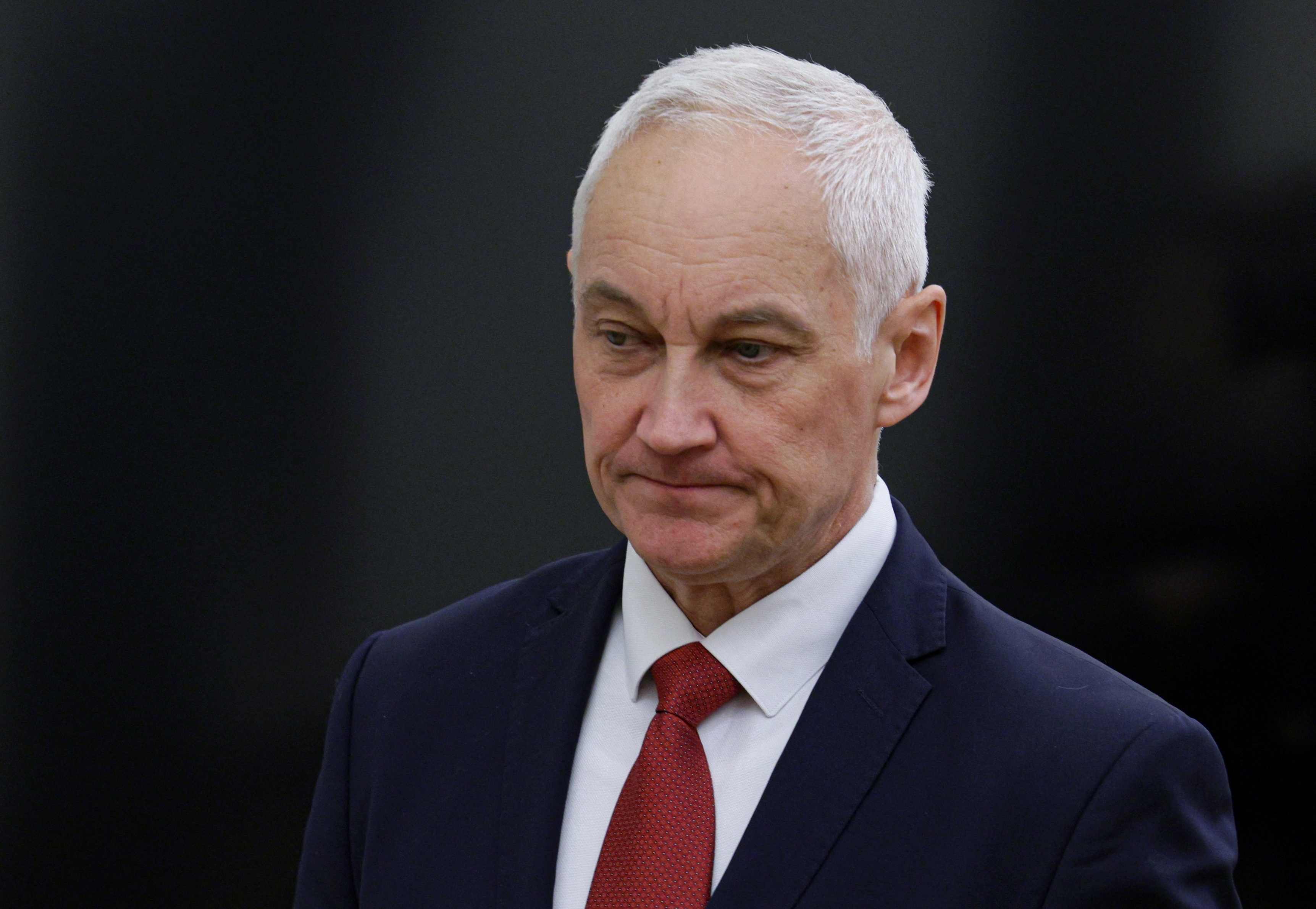
MOSCOW, June 28 (Reuters) – Russian Defence Minister Andrei Belousov has ordered the army’s General Staff to come up with proposals on how to promptly deal with “provocations” by U.S. strategic drones operating over the Black Sea, the defence ministry said on Friday.
The ministry said in a statement that it had noted increased activity in the area from U.S. drones which it said were carrying out reconaissance and gathering targeting information for high-precision Western weapons used by Ukraine to strike Russian facilities.
“This demonstrates the increasing involvement of the United States and NATO countries in the conflict in Ukraine on the side of the Kyiv regime,” the defence ministry said.
“Such flights multiply the likelihood of airspace incidents with Russian aircraft, which increases the risk of a direct confrontation between the (NATO) alliance and the Russian Federation.”
It said that NATO countries would be responsible for any such incidents.
The statement did not mention Crimea, the Black Sea region which Moscow annexed from Ukraine in 2014. But Russian military facilities in Crimea have been repeatedly targeted by Ukrainian forces, including with Western missiles.
Sign up here.
Reporting by Reuters
Editing by Andrew Osborn
Our Standards: The Thomson Reuters Trust Principles., opens new tab
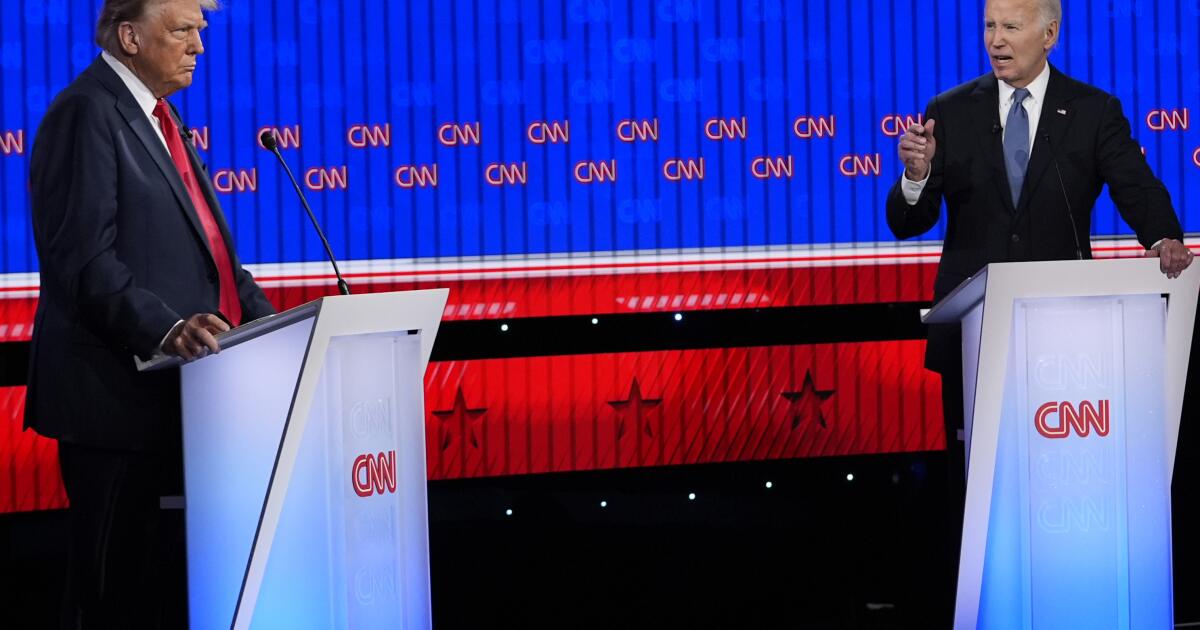
When two flawed presidential candidates, President Biden and former President Trump, met in their high-stakes debate Thursday night, each hoped to pass a test in voters’ eyes. Both failed — but Biden’s stumbles, fairly or not, are likely to cost him more than Trump’s.
Biden needed to quell concerns that he’s too old to serve effectively for another four years. His stumbling, occasionally incoherent performance fell far short. He looked every one of his 81 years — markedly less vigorous and crisp than the commanding figure who delivered an effective State of the Union address about four months ago.
Trump, who is 78, needed to look and sound presidential to appeal to voters who doubt his temperament and his stability. He needed to avoid his self-indulgent temptation to claim that every election he loses was rigged and every legal setback he suffers was politically motivated. He failed, too.
The 90-minute debate was a dispiriting race to the bottom, pitting a tongue-tied octogenarian against a pathological liar. Undecided voters looking for a positive reason to vote for one or the other were unlikely to find enlightenment.
But that doesn’t mean it was a tie. If it had been a boxing match — an apt analogy, given its flurries of verbal punches — a referee would probably have awarded Trump a win on points, for two reasons.
First, Biden came into the debate as the candidate who needed to shake up the campaign. Trump has led recent national polls by a hair, but he is clearly ahead in most of the half-dozen battleground states that will decide the election. Biden hoped to change that, so he needed a win.
Second, while Trump missed an opportunity to appeal to undecided voters and expand his support, he did a more effective job than Biden of presenting his favorite talking points. Many of them were untrue and some were nonsensical, but most went unrebutted by either Biden or CNN’s moderators, who had sworn off fact checking for the evening. That left Trump no worse off than when he started.
A debate’s impact often comes down to a few memorable moments. Many voters didn’t watch at all, and some who tuned in didn’t stay for all 90 minutes. But over the next week or two, some of their worst moments will be played and replayed, magnifying their effect.
A few examples of each candidate’s worst moments may convey the flavor of the evening. (A list of their best moments would be sparse.)
Biden’s voice was hoarse and halting, especially early in the debate. He appeared to lose his train of thought more than once; his voice trailed off at the end of several answers. He ended one tangled explanation of his tax proposals with the puzzling phrase: “if we finally beat Medicare.” After another such moment, Trump seized the opportunity to make sure viewers noticed, saying: “I really don’t know what he said at the end of that sentence. I don’t think he knows what he said, either.”
Trump lied with his customary enthusiasm, reeling off bogus claims he has honed in dozens of stump speeches. He said he produced “the greatest economy in the history of our country” during his term as president, but that isn’t true under any definition of economic success. He claimed Democratic states are routinely killing infants “after birth,” a luridly inaccurate description of late-term abortion. He claimed Biden’s immigration policies have allowed “18, 19, could be 20 million” undocumented migrants into the country, a wild exaggeration, and that the Biden administration is “putting them on Social Security and Medicare.” (It isn’t.)
All those whoppers are familiar to anyone who has sat through any of Trump’s rallies; all have been debunked. But there were too many for Biden to knock down one at a time, so he responded: “Everything he just said was a lie.”
And Trump ducked any question he didn’t want to answer — including whether he will abide by the result of the election. “If it’s a fair and legal and good election, absolutely,” he said — but instantly undercut that semi-pledge by claiming that the 2020 election was riddled with fraud. (It wasn’t.)
There are vast differences between these two candidates on important issues before the country, and voters deserved a debate that illuminated their choice. This was not that debate.
Instead, it was a missed opportunity for both candidates — and one that not only damaged Biden’s chances of shaking Trump’s lead, but was certain to reopen the barely suppressed debate among Democrats over whether they have their best possible nominee.
With four months remaining before election day, the race undoubtedly has more twists and turns to come. But Thursday’s debate was surely a pivotal moment — a setback for Biden that he must now try to repair.
Read more from columnist Doyle McManus on Trump and California:
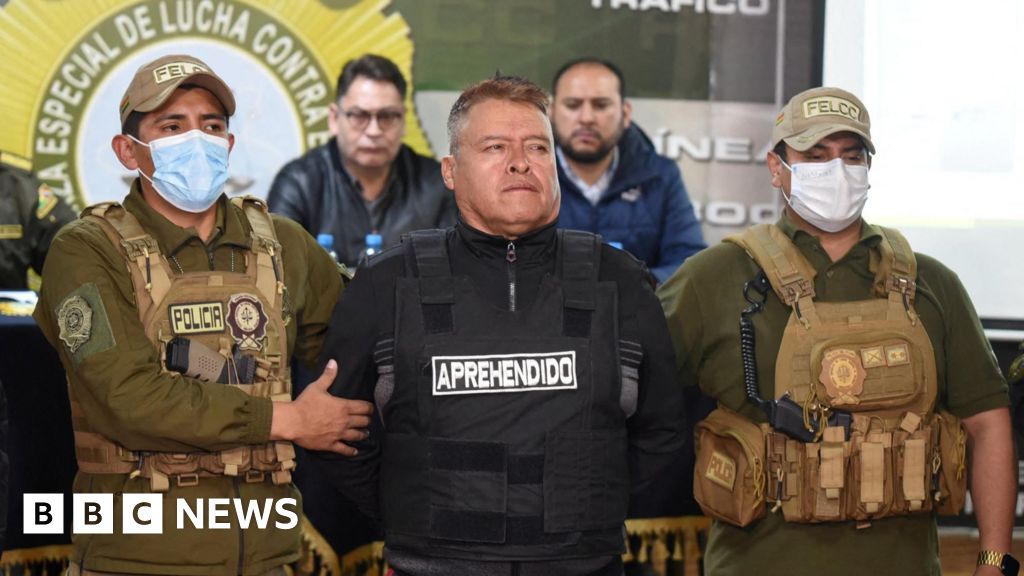
21 minutes ago
By Will Grant, Mexico, Central America and Cuba Correspondent • Kathryn Armstrong, BBC News • Ido Vock, BBC News
Bolivia’s General Zuniga arrested for coup attempt
Bolivian police have arrested the leader of an apparent attempted coup, hours after the presidential palace in La Paz was stormed by soldiers.
Hundreds of troops and armoured vehicles had taken up position on Murillo Square where key government buildings are located. One armoured vehicle smashed down the main gate of the presidential palace, allowing soldiers to enter. They all later withdrew.
The rebel military leader in charge, Gen Juan José Zúñiga, had said he wanted to “restructure democracy” and that while he respected President Luis Arce for now, there would be a change of government. He was later arrested.
Gen Zúñiga was removed from his role on Tuesday, after he made inflammatory comments about Bolivia’s former president, Evo Morales, during an interview the previous day.
President Arce condemned the coup attempt, calling on the public to “organise and mobilise… in favour of democracy”.
“We cannot allow once again coup attempts to take Bolivian lives,” he said in a televised message to the country from inside the presidential palace.
His words clearly resonated, with pro-democracy demonstrators taking to the streets in support of the government.
In dramatic footage seemingly filmed inside the presidential palace, President Arce could be seen confronting Gen Zúñiga, ordering him to stand down and asking him to vacate the role.
He also announced he was appointing new military commanders, confirming reports that Gen Zúñiga had been dismissed after openly criticising Mr Morales.
Mr Morales, who also condemned the coup attempt, called for criminal charges to be brought against Gen Zúñiga and his “accomplices”.
The public prosecutor’s office has opened a criminal investigation. The head of the Bolivian Navy, Vice-Adm Juan Arnez Salvador, has also ben arrested.
Gen Zúñiga’s exact motivations for launching the coup remain unclear.
He was sacked after appearing on television on Monday, saying he would arrest Mr Morales if he ran for office again next year, despite the former president being barred from doing so.
Mr Morales was forced out of office in 2019 by military chiefs who said he was trying to manipulate the result of a presidential election, sending him into exile in Mexico.
Speaking from Murillo Square after it was taken by troops, he accused an “elite” of taking “over the country, vandals who have destroyed the country.”
But moments before his arrest, the general told reporters that the president had instructed him to get out the “blindados” (armoured vehicles), in a bid to improve his waning popularity. He was bundled into a waiting police van seconds later.
Andrea Barrientos – a leading opposition senator – echoed his claims, suggesting that an economic and judicial crisis had prompted Mr Arce to launch a “self-coup”.
“I will say that the government has a lot of questions to answer to the people of Bolivia, and they need to explain this situation very well,” she added. “We will say that we need a deep investigation about this situation.”
It is increasingly clear that Wednesday’s move this was a short-lived and ill-judged military uprising rather than any wider unravelling of power.
Nevertheless, the coming weeks will be key in establishing whether Gen Zuñiga’s military insurrection was just an isolated incident.
Certainly, the government now looks more vulnerable, and others may try to dislodge Mr Arce’s administration – albeit through politics rather than via the military.
Mr Morales called on his supporters, particularly in the country’s indigenous coca-growers movement, to take to the streets to demand an end to the attempt coup.
That display of popular power may well have helped strengthen the resolve against Gen Zuñiga’s plans, which also included freeing “political prisoners” including former leader Jeanine Áñez.
Both Mr Arce and his predecessor belong to the same political party, despite internal political feuds. Their alliance has led some Bolivians, including Gen Zúñiga, to worry that Mr Morales might seek another term in office.
Concerns come after he tried to bypass the constitution and seek a fourth term in 2019. Mr Morales went on to win the vote, but he was forced to resign and flee the country after violent protests.
The centre-right Jeanine Áñez was the country’s interim leader between 2019-20, but was sentenced to 10 years in jail over what prosecutors say was a coup to oust her predecessor Mr Morales. The incumbent president, Mr Arce, went on to win a re-run vote in 2020.
Formerly allies, Mr Arce and Mr Morales have not seen eye to eye on much recently, but they were united in their condemnation of the use of troops to force political change in Bolivia.
Before Mr Morales took power in 2005, Bolivia was one of the most politically volatile nations in the Americas. His time in power brought much-needed stability to the Andean nation, at least until its ignominious end.
For his part, Mr Arce – who was elected after a period of instability following the 2019 election – will have been heartened by the speed of the regional response.
Close allies like the left-wing governments in Venezuela and Colombia were quick to condemn what was happening and call for democracy to prevail. Washington also called for calm.
In Paraguay, centre-right President Santiago Peña also condemned the attempted coup.
Even those Bolivians who opposed his socialist rule will not want to see a return to a dark time in South America where militaries with terrible human rights records often pushed out the country’s democratically elected leaders at the barrel of a gun.
But Jhanisse Vaca Daza – a human rights activist – said she feared Mr Arce could use the apparent coup as a reason to crack down on his opponents.
“It will legitimise and give (President) Arce’s government more power to arrest new members of the opposition who they deem may be a threat to their governance,” she said.
“The fear for many people that are currently Legislative Assembly members is that this could also lead to either closing the Legislative Assembly or arresting members that may be suspected to have collaborated with the military.”
Watch: Armoured vehicle rams Bolivia’s presidential palace
Министр внутренних дел РФ Владимир Колокольцев прилетел в Нью-Йорк для участия в IV саммите руководителей органов полиции государств – членов ООН (UNCOPS-2024). Об этом в среду, 26 июня, сообщила пресс-секретарь министерства Ирина Волк. Саммит пройдет 26-27 июня, его цель – обсуждение вопросов по укреплению международной безопасности и сотрудничеству национальных полиций и полиции ООН.
На полях саммита запланированы встречи Колокольцева с заместителем генерального секретаря ООН по миротворческим операциям Жан-Пьером Лакруа, а также двусторонние встречи с некоторыми главами делегаций правоохранительных органов иностранных государств, сообщила Волк.
Колокольцев: ООН должна дать оценку удару ВСУ по Крыму
В ходе встречи Колокольцев призвал ООН “дать должную оценку” ракетному удару украинских войск по Крыму 23 июня, в результате которого четыре человека погибли и более 140 пострадали. По словам Волк, министр выразил уверенность, что “все ответственные” за эту атаку “понесут неотвратимое наказание”.
Глава МВД России также заявил о попытках некоторых западных государств исключить РФ из Интерпола “в обход всех уставных документов Организации”, он указал на “политизацию существующих международных площадок” и “проявления русофобских настроений в мире”.
Колокольцев подчеркнул, что МВД РФ открыто к сотрудничеству “по всему спектру вопросов миротворческой деятельности”.
Колокольцев находится под санкциями США
Министерство финансов США в 2018 году ввело персональные санкции в отношении Владимира Колокольцева. В связи с полномасштабным вторжением РФ в Украину Колокольцев был включен в еще один санкционный список Минфина США. Согласно американскому законодательству лицам, попавшим под ограничения, запрещен въезд на территорию США.
Bolivian President Luis Arce stared down a short-lived attempted coup on Wednesday, after calling on the public to “organize and mobilize” in defense of democracy as soldiers and armored military vehicles withdrew from surrounding government buildings in La Paz.
Bolivia has a long history of political instability, including military coups, and the failed takeover comes as the landlocked South American country of about 12 million people struggles with a spiraling economic crisis that has sparked street protests.
“We cannot allow coup attempts to take Bolivian lives once again,” Arce said from the presidential residence, Casa Grande, as the attempted coup got underway. “We want to urge everyone to defend democracy.”
In dramatic scenes broadcast on Bolivian television, Arce could be seen confronting the former army chief Gen. Juan José Zuniga, who led the coup attempt, as he stormed into the presidential palace hallway.
“I am your captain, and I order you to withdraw your soldiers, and I will not allow this insubordination,” Arce told Zuniga, according to the Associated Press.
Zuniga, who was dismissed as commander of the Bolivian army just a day earlier, was later detained and seen being forced into a police vehicle, according to local media. His current whereabouts are unknown.

Late Wednesday, Bolivian Defense Minister Edmundo Novillo told a news conference the armed forces were “under control.”
“We now have total and absolute control over our armed forces. Everything is under control now. We urge the population that everything goes back to normal,” he said, according to state-run Bolivia TV.
The attempted coup was widely condemned by the Bolivian government and international leaders. Bolivia’s Attorney General’s Office said it has launched a criminal investigation against Zuniga and “all the other participants” involved in the incident.
Bolivia’s latest political showdown comes as tensions rise over plans by leftist former president Evo Morales to run for reelection against one-time ally Arce in general elections next year.
Meanwhile, the country is contending with an economic crisis marked by dwindling foreign currency reserves, particularly the US dollar, and shortages of fuel and other basic necessities.
Earlier Wednesday, footage from the scene showed armed soldiers occupying Murillo Plaza, a main square in La Paz where the national executive and legislative offices are located.
Armored vehicles were seen ramming into the doors of Bolivia’s government palace, according to the Associated Press, as former president Morales, who is a member of Arce’s Movement to Socialism (MAS) party, said on X that a “coup d’état is brewing.”
Video also showed some civilians facing off with soldiers in Murillo Plaza during the coup attempt.
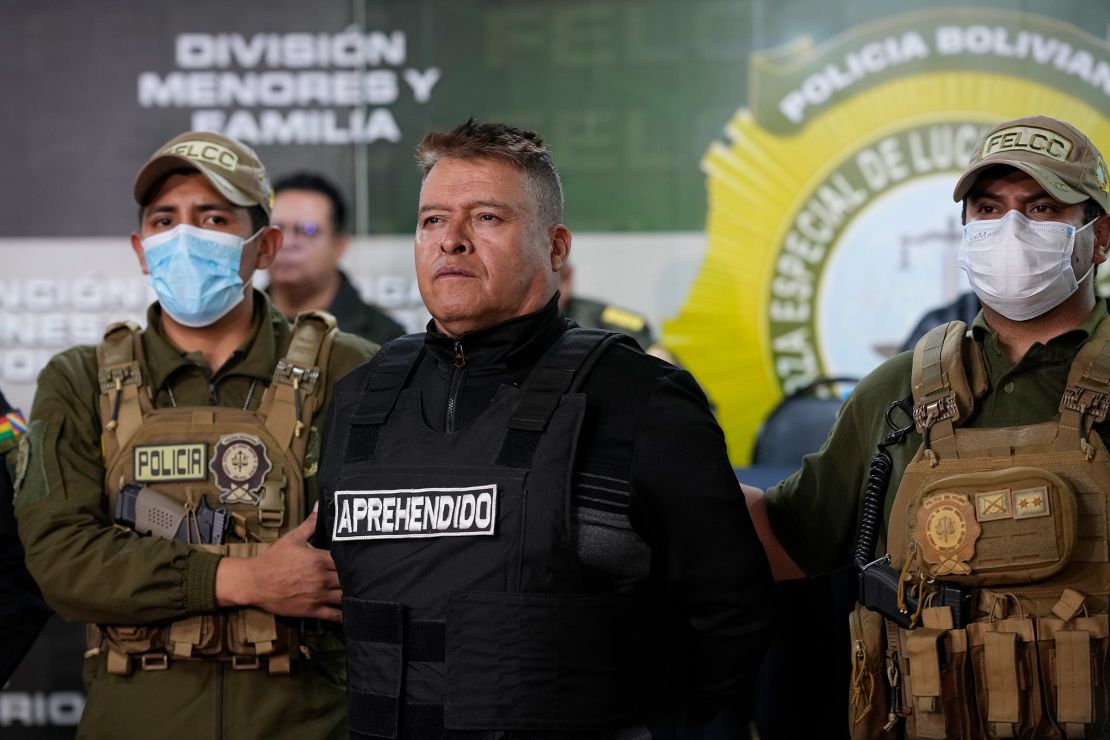
Prior to his detention, former army chief Zuniga addressed reporters in the square on Wednesday, flanked by soldiers, saying, “We want to restore democracy,” as he spoke of the country’s economic woes. He had earlier been dismissed reportedly for threatening to block a bid by Morales for reelection.
“The people have no future, and the army has the courage to look out for the future of our children, the well-being and progress of our people,” he said.
He vowed “to free all political prisoners” including former president Jeanine Anez, currently imprisoned for what the courts said was her role in deadly protests that erupted after her ascension to power in 2019.
Amid the chaos, President Arce announced new military commanders, including Zuniga’s replacement as army chief, Gen. José Sánchez.
The situation appeared to have been defused when Sánchez ordered the soldiers in the square to return to their units.
“I order all personnel mobilized in the street to return to their units,” Sanchez said from a podium at the presidential palace to cheers and applause.
Armed vehicles were seen leaving Murillo Plaza soon after, according to footage from Bolivia TV. Arce also announced new heads of the navy and the air force.
CNN is trying to contact Bolivia’s government for comment.
Morales, who publicly split from his former ally Arce, resigned as president in 2019 following mounting protests over accusations of election fraud; at the time, he claimed he was forced out in a coup.
Before his dismissal, former army chief Zuniga had reportedly said Morales should not be able to return as president, and threatened to block him if it happened.
Gustavo A. Flores-Macías, professor of government and public policy at Cornell University, told CNN the attempted coup reflects widespread discontentment in the country.
“What is happening in Bolivia is that broad sectors of society, across social strata, across all levels, are very unhappy with the way things are, especially on the economic front. And, we have an election coming in 2025,” he said.
In that election, Arce and Morales “seemed to be in this collision course. Both of them angling to become the next president,” he added.
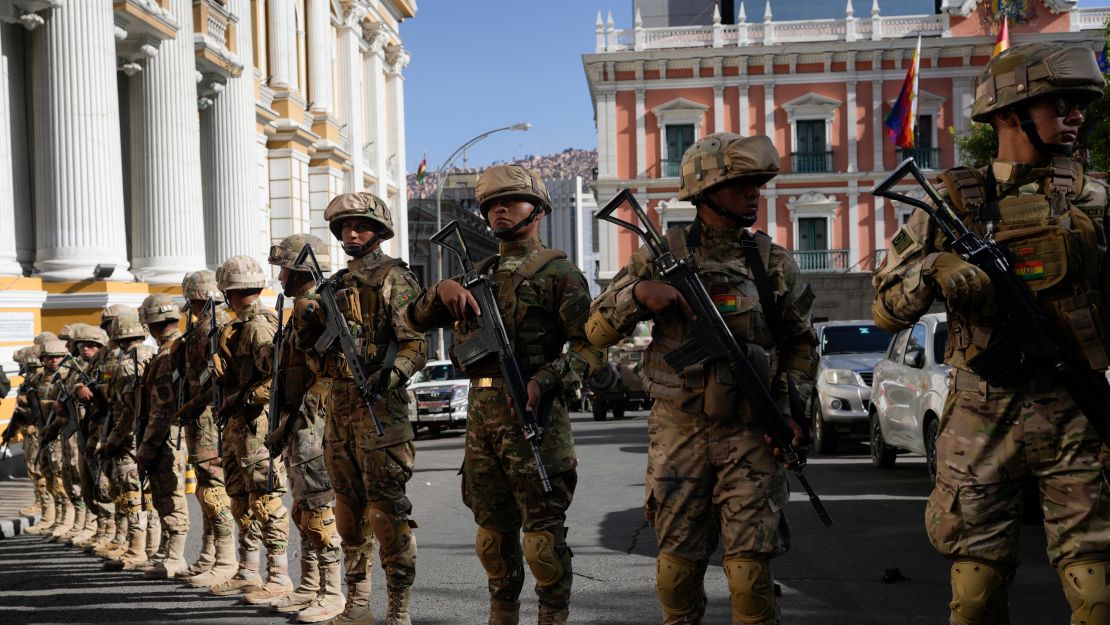
Bolivia’s Attorney General’s Office launched a criminal investigation against Zuniga later on Wednesday, with the Prosecutor’s Office saying on X that “all the other participants” involved in Wednesday’s events in La Paz would also be investigated.
The Attorney General’s Office said it will make “all the necessary efforts” to identify all persons involved and further investigate the attempted coup and impose the “maximum punishment on those responsible.”
Fredy Mamani, former deputy foreign minister of Bolivia and ally of Morales and Arce, told CNN that despite the “undemocratic” nature of “the tanks, the uniformed soldiers and taking the square… it is essential to highlight that the Bolivian people are united in the face of any coup d’etat.”
News of the attempted coup was roundly condemned by international and regional leaders, including Paraguay’s President Santiago Peña, Mexico’s president, and the European Union.
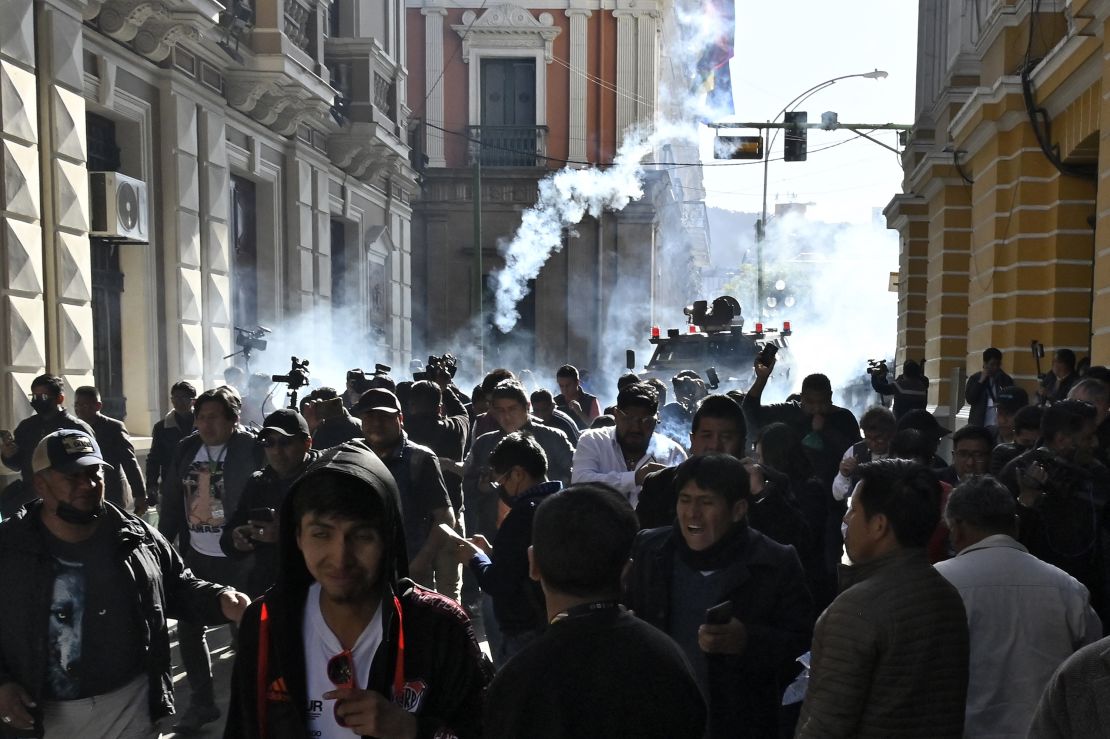
“We express our support for democracy in our brother country and to the legitimate government of Luis Arce,” Chile’s President Gabriel Boric said on X.
The US Embassy in La Plaz said it was “closely monitoring the situation.”
“We reject any attempt to overthrow the elected government and ask for respect for the constitutional order,” an embassy statement said on X.
The secretary general of the pan-American Organization of American States (OAS), Luis Almagro, condemned the mobilizations in the “most energetic way,” on X, saying the “army must submit to the legitimately elected civil power.”
The EU said it opposed “any attempt to disrupt the constitutional order in Bolivia and overthrow democratically elected governments,” adding it stands in solidarity with the Bolivian government and its people, according to a post from European policy chief Josep Borrell on X.
This story has been updated with additional developments.
